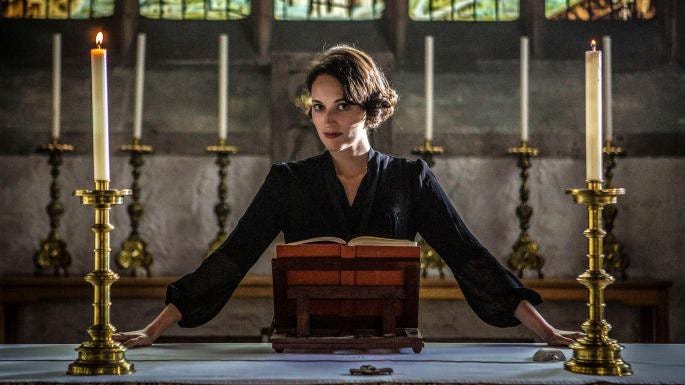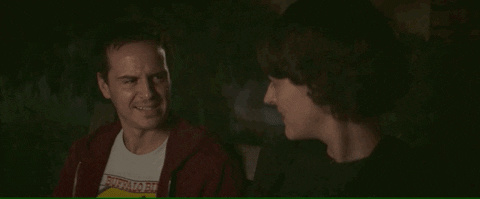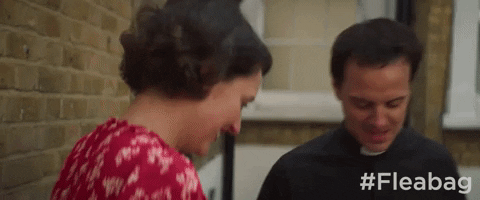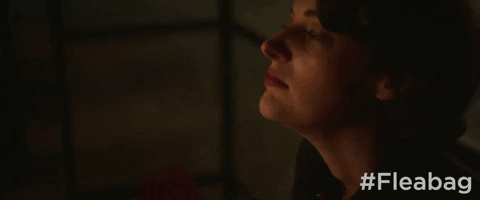I wrote this sometime last year, shortly after I binge watched both seasons. If you still haven’t seen it, watch it.
The Internet is currently obsessed with Fleabag, a British show written by and starring Phoebe Waller-Bridge (oh, you genius woman, someday I’d like a map of how your brain works), and without giving you any spoilers — it’s a show about a young woman, whose name we never find out, who is only known as Fleabag, navigating her life and grappling with a personal tragedy, all while she breaks the fourth wall and talks directly to us. It’s a short two seasons, with a total of six episodes each, can be streamed on Amazon Prime, and has been described as being one of the smartest, most devastating, and at the same time, funniest thing on television in YEARS.

SPOILERS AHEAD
It’s difficult to put down into words what exactly it is about Fleabag that I, or almost every woman who watches it, loves. Is it because we recognise who she is, perhaps because we are her? Or is it because we recognise her pain? Because pain, loss, and guilt are universal, and while the degree of it may change depending on who or what you’ve lost, the punch-to-the gut feeling is the same.
And pain, loss, guilt — these are the things that build the bedrock of Fleabag the person and Fleabag the show. The very fact that the protagonist of the show names herself Fleabag is a hint — this is a character that is grappling with the loathing one feels when they’ve done something horrible, and knows it. Fleabag is an unflinching look into the lives of modern women, someone we immediately fall in love with not just because of how honestly imperfect she is, but in how perfect she is at being us. In fact, Fleabag is so good in its caustic humour that it can be ridiculously easy sometimes to forget that the show is primarily about grief. Almost everything that Fleabag does — breaking the fourth wall, the constant acting out, the promiscuity — they’re all undeniable coping methods, all designed to keep the pain at a distance. It’s almost how clinically depressed people cut themselves to focus on physical pain, only to dull out another kind of pain. And it makes perfect sense then, when her father tells her, “I think you know how to love better than any of us. That’s why you find it all so painful.”
And that’s why she does everything that she does. When her therapist asks her about friends, she looks at us, the viewers, because we are all she has. Fleabag carries around the guilt of feeling that she is responsible for her friend’s death, and that, coupled with the loss has ensured she looks for love nowhere else. Because she loves intensely, she hurts intensely.
And this is why, when season two begins with Fleabag looking conspiratorially at us, informing us that “This is a love story,” we’re hooked. Well, the fact that she says it in a fancy bathroom, in a fancy jumpsuit, with blood gushing down her nose intrigues us as well, but we’re more interested in who the subject of the love story is, considering she went on a sex bender last season. And that’s when we meet Hot Priest, who has successfully ruined us for all, well, priests. And this is where the brilliance of Phoebe Waller-Bridge lies — in the way she takes a regular attractive man and turns him into someone you fall in love with, instead of someone you only lust over. The fourth wall break that Waller-Bridge is so good at, which was meant to be a secret joke between Fleabag and us, is suddenly not. Hot Priest’s “Where did you just go?” was probably the most unexpected twist on television since Ned Stark’s death, and what started out as a fun thing turns into something important — someone in Fleabag’s life has started to notice that she keeps talking to someone else, someone not in the room. And for the first time, perhaps ever, Fleabag is fully visible to another person.


And is this the love story we’re meant to be watching? All hints point to yes. Fleabag gazes adoringly at him and “his beautiful neck,” mistakenly saying it out loud to him instead of just us, showing us how badly she’s fallen. She flirts with him, incessantly, and he flirts back too, incessantly — turning cups of tea into long G&T sessions, calling her out when she calls him Father; “Fuck you calling me Father like it doesn’t turn you on just to say it;” and yet leaving his tenderness for her for all to see. Somehow, Waller-Bridge takes that tired trope of a priest offering you salvation, and in her very capable hands, turns him into a man we are all desperately hoping will renounce his faith for her. Their scenes together are so electric, so fraught with sexual tension, so palpably real, that we believe her inner prophet who says so definitely, “We’re going to have sex.” Hot Priest may fight against it, but all he’s doing is coming to the slow realisation of what Fleabag’s therapist told her when she was still pretending to grapple with her lust, “You already know what you’re going to do.” They both know what they’re going to do, we’re just watching them reach that eventual conclusion.

And once they do reach that eventual conclusion, with Fleabag turning away Hot Misogynist who gave her nine orgasms (nine!), it seems like both Fleabag and Hot Priest have found a happy-ever-after. But life rarely turns out that way, does it? And we circle around back to what the second season started with: “This is a love story.” Except, it’s not a traditional girl-meets-priest love story. Fleabag has closed herself off from love after she lost her mother and Boo because it hurts too much to lose, because, as Hot Priest says, “Love is awful. It’s painful. Frightening. It makes you doubt yourself, judge yourself, distance yourself from the other people in your life. Makes you selfish, makes you creepy, makes you obsessed with your hair. It takes strength to know what’s right. And love isn’t something that weak people do. Being a romantic takes a hell of a lot of hope.” Something about how they feel about each other forces Fleabag and Hot Priest to ignore their fear of loss and cheating on God. This is absolutely a love story, and it is of Fleabag’s with herself.

Fleabag has learnt to love again, lose again, and she is okay. Instead of dulling that part of her that loves intensely, that seeks to numb it by using sex, humour, and us, as a distraction from feeling, she finally decides to cherish it instead. Watching her look at the statue that Godmother (Olivia Colman can eat my heart out, she is SO GOOD here) reveals was based on her mother, we watch her finally accept that the only way she can outlive the grief she feels over her mother and Boo’s death is to grieve them, and to nurture the memories she has that live inside of her. And as she sadly looks back at us and shakes her head, signalling that we can’t follow her anymore, that we aren’t part of her life anymore, it’s a bittersweet feeling. Talking to us was Fleabag’s way of escaping her pain, but she doesn’t have to escape anything anymore. So, with the strains of Alabama Shakes singing “See, I’ve been having me a real hard time, but it feels so nice to know I’m gonna be alright” as she walks off into the night, we know she’s going to be alright.





I'm rewatching Fleabag for the millionth time and this essay beautifully described what I love most about the show, thank you for sharing!